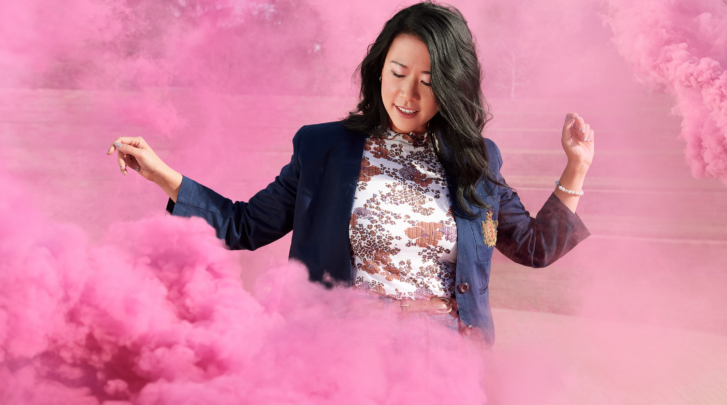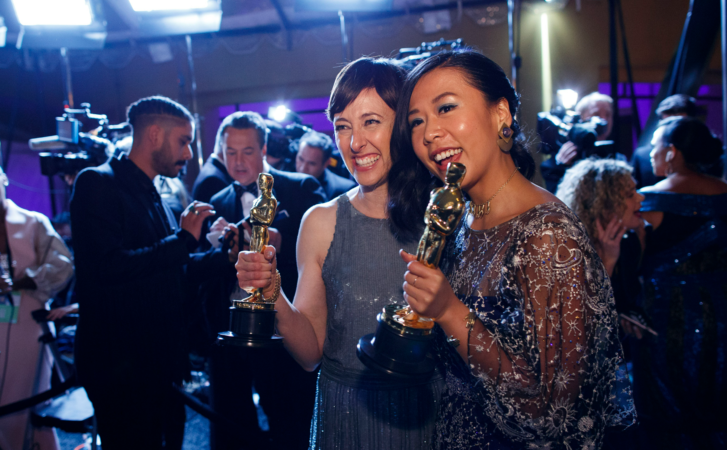The Canadian director won an Oscar for her touching Pixar short. Now, in her debut feature, she plumbs her Toronto childhood to make a movie for everyone.
There’s a scene in Turning Red, the upcoming Pixar movie directed by Canadian wunderkind Domee Shi, that had me guffawing in bed. Mei, the 13-year-old protagonist, begins sketching a boy on the pages of her math homework when she realizes she’s drawing the likeness of Devon, a 17-year-old boy who works at the local Daisy Mart in Toronto’s Chinatown, where she lives.
Mei’s right brain takes over, her hand unable to pull away from the paper—Devon’s got chiselled shoulders; Devon winks at her and a heart floats from his eye; he’s embracing her now. Mei realizes what she’s drawing, and she’s giddy. Her eyes grow wide and her cheeks flush red. Then Mei’s mom, Ming, voiced by Canadian actress Sandra Oh, walks into her room. Mei shoves the sketchpad under her bed, but the corner of it pokes out. It’s a matter of seconds before her mom opens the book and sees the drawings inside.

This is my life, I think, recalling a time in high school when my mom went through my backpack and found condoms inside. “I got them for free! At a clinic!” I yelled as she grabbed a handful and threw them in the bin.
Like Mei, whose story is loosely based on Shi’s family, I’m the only daughter of immigrant Asian parents. I grew up in Toronto, in an apartment just walking distance from where Shi lived. I was born two years ahead of her, in 1987, but we lived somewhat parallel lives, taking the TTC to school and asserting our tween independence while trying to pacify our overly concerned mothers.
Mei, who turns into a giant red panda every time she experiences intense emotion, might feel familiar to millennials who came of age in the early 2000s; it’s a film that brings us back to the days when we belted Britney Spears’s lyrics “Hit me baby one more time” and plastered Justin Timberlake’s bleached, spiky hair-framed face across our bedroom walls.
But there’s another layer to the movie that makes it feel like it’s mine. Shi doesn’t just create a story about parental expectation as it conflicts with the child’s own wants and dreams, a stereotype reverted to by many Western films depicting Chinese families (think Crazy Rich Asians). Instead, by drawing on her own life, and her own relationship with her parents, she portrays a family dynamic that isn’t “Asian,” per se, but ordinary: challenging, rewarding, messy and full of both tenderness and regret.
“Did you ever think that your relationship with your parents would be . . . ” I ask the first time I speak with Shi over Zoom, in late December. “My life’s work?” Shi says, smiling.
***
In many ways, Mei’s mother, Ming, is your typical “tiger mom”: she expects excellence from Mei across academics, extracurriculars and at home; she’s not afraid to tell Mei if she thinks one of her friends is “odd”; and she has no problem showing up at Mei’s school unannounced, regardless of how that might make Mei feel.
Tiger moms, who adopt a style of parenting that’s generally authoritarian—demanding, overprotective, emotionally unsupportive—were first so called by Chinese-American law professor and author Amy Chua, who wrote the 2011 memoir Battle Hymn of the Tiger Mother. The expression has since been adopted by the American Psychological Association and referenced widely across North American media and pop culture.
“There’s a sense from the trailer that [Ming] is a tiger mom, but I’m also just like, she’s a pretty nice mom,” says Adrian De Leon, a Filipino professor from Toronto who teaches American studies and ethnicity at the University of Southern California. “There is going to be a lot of temptation, especially from audiences, to try to fit [this movie] into an Orientalist perspective to figure out what is quintessentially Asian about it, when actually what is so quintessentially Asian about the story is that it is so normal.”

Shi reflected on the relationship with her own mother, Ningsha, through the eight-minute short Bao; Shi’s directorial debut for Pixar, it won the 2019 Academy Award for best animated short film. The plot line centres on a Chinese mother who grieves her only son’s departure from home. As the mother grapples with the concept of an empty nest, one of her handmade dumplings comes to life and becomes her fantasy son, until he grows up too. In the end, the mother swallows her dumpling so he’ll never have the chance to leave.
Turning Red looks at the parent-child relationship from the kid’s point of view. “When I was younger, I was like, ‘Why are my parents so unfair? Why are they so crazy and overprotective?’ ” Shi says. “It just comes from wanting to protect your kid and the experiences my mom went through when she was younger in coming to a new country, and having this only child who could be taken away at any moment by the forces of the universe.”
Shi reflected on the relationship with her own mother, Ningsha, through the eight-minute short Bao; Shi’s directorial debut for Pixar, it won the 2019 Academy Award for best animated short film. The plot line centres on a Chinese mother who grieves her only son’s departure from home. As the mother grapples with the concept of an empty nest, one of her handmade dumplings comes to life and becomes her fantasy son, until he grows up too. In the end, the mother swallows her dumpling so he’ll never have the chance to leave.
Turning Red looks at the parent-child relationship from the kid’s point of view. “When I was younger, I was like, ‘Why are my parents so unfair? Why are they so crazy and overprotective?’ ” Shi says. “It just comes from wanting to protect your kid and the experiences my mom went through when she was younger in coming to a new country, and having this only child who could be taken away at any moment by the forces of the universe.”
“So much of racism, especially in the arts, is that stories about us are imagined by other people,” De Leon says,“that we do not have the agency and the capacity to not only imagine stories and be storytellers in our own right, but for that work to be considered on its own terms.”
De Leon refers to Bling Empire, a Netflix series that follows the life and friendships of Kevin Kreider, a Korean-American model who lives in Los Angeles, as one of his favourite “himbo”—slang for an attractive but not necessarily intellectual dude—stories. “There’s a certain power in not having to be this . . . ultra-smart, ultra-wealthy, ultra-hard-working Asian person,” he says. “We do have the right to just lounge around, work out and look hot.”
At the virtual publicity event for Turning Red, Shi was asked about the school security guard in the film, apparently Pixar’s first-ever turban-wearing Sikh character. “There’s quite a prominent Sikh population in Canada . . . the leader of the NDP Party, he’s Sikh,” Shi said. “And growing up, I was exposed to a lot of Sikh people in my classroom . . . the specific Sikh security guard was inspired by [Baltej Singh Dhillon] the first [turban-wearing] Royal [Canadian] Mounted Police officer.”
Sengupta, who is originally from India, is elated to see different Asian cultures interacting in film and television exactly the way they would in a city like Toronto. He believes that Canadians are leading the charge—with shows like Kim’s Convenience and Run the Burbs—in giving audiences a glimpse of the diaspora here, where Chinese, Koreans, Filipinos, Japanese, Indians, Pakistanis, Sri Lankans, Tamils, Vietnamese and Indonesians are friends, neighbours, classmates and co-workers. “Representation is key,” he says. “The only thing [that] represent[ed] [me] were the brown villains in movies, like Raza in the original Iron Man.”
When I ask Shi whether she thinks Mei could be viewed as a model minority, she shakes her head. “I don’t think so,” she says. “She’s so funny and dorky,” as if to say, can’t Mei be just that?
***
Ningsha and Le haven’t seen Turning Red yet, but they both smile when I tell them their daughter credits her relationship with her parents as the throughline of her work.
I ask them to think about how she got there; what defined her as a child. Art, music and friends, they say. “Hard work” is a term Le uses often. Ningsha, on the other hand, has an urge to express regret. She remembers the time in middle school when Shi flunked her Grade 10 flute exam and had to take it a second time. “If she said, ‘I quit,’ I think about how that would have been okay. But she never said, ‘I’ll stop,’ and I never said, ‘You can stop now.’ ”
Turns out Shi always wants to finish what she starts: “I’m a completionist,” she says. “I think my mom is too.” When I ask how her relationship with her mom is reflected in Turning Red, she offers up a spoiler: “The red panda magic is actually something that Mei inherited from her mom, and the way that her mom has handled [it] is very different than how Mei wants to handle it. You see the difference between the two generations and how they deal with all of the messiness that’s inside of them.”
The Shi family is like most; there are things you don’t reveal to each other. At the press event, Shi tells the media there’s definitely a secret notebook somewhere in her room back in Canada, which she hopes her parents never see. In our interview, she tells me about asking a cousin who was visiting her parents in Toronto: “Can you take it and just burn it? Throw it away?”
Over Zoom, Le quickly flips through one of Shi’s sketchbooks and stops to show me a drawing. “Handsome boy,” he points out, as I take in the big, star-like anime eyes. The sketchbooks aren’t secret—her parents have seen them all.
Article From: Maclean’s
Author: Christina Gonzales

